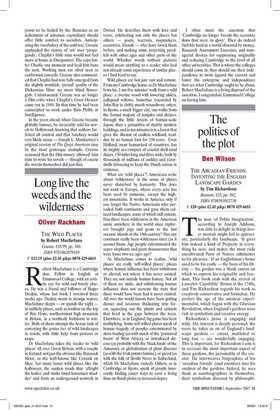Long live the weeds and the wilderness
Oliver Rackham THE WILD PLACES by Robert Macfarlane Granta, £18.99, pp. 340, ISBN 9781862079410 cc) £15.19 (plus £2.45 p&p) 0870 429 6655 Robert Macfarlane is a Cambridge don, Fellow in English at Emmanuel College, with an artistic eye for wild and lonely places. He was a friend and follower of Roger Deakin, whose last book I reveiwed three weeks ago. Deakin swam in strange waters; Macfarlane sleeps — or spends the night — in unlikely places, such as tentless on the top of Ben Hope, northernmost high mountain in Britain, in a northerly hailstorm in winter. Both of them attempt the heroic task of conveying the genius loci of wild landscapes in words, with little help from pictures or maps.
Dr Macfarlane takes the reader to 'wild places' all over Great Britain, with a couple in Ireland: not just the obvious like Rannoch Moor, or the well-known like Coruisk on Skye, but many lesser wild places like the holloways, the sunken roads that 'affright the ladies' and 'make timid horsemen shudder' and form an underground network in Dorset. He describes them with love and verve, celebrating not only the places but others — poets, warriors, mapmakers, eccentrics, friends — who have loved them before, and making some surprising parallels with other ages and other parts of the world. Whether words without pictures would mean anything to a reader who had not already some experience of similar places I find hard to say.
Wild places are not just vast and remote. From my Cambridge home, as Dr Macfarlane from his, I am five minutes' walk from a wild place: a riverine wood with towering alders, collapsed willows, butterbur (recorded by John Ray in 1660), marsh woundwort, otters. In Kyoto, a much bigger city, one walks from the formal majesty of temples and shrines, through the little streets of human-scale Japan, then a penumbra of shabby modern buildings, and in ten minutes is in a forest that gives the illusion of endless wildland, trodden by no human foot for 150 years. Even Holland, most humanised of countries, has its mighty sea-rampart of coastal shell-sand dunes, 150 miles long and three wide, built by thousands of millions of cockles and razorshells labouring to keep the Dutch nation in existence.
What are 'wild places'? Americans write about 'wilderness' in the sense of places never disturbed by humanity. This does not work in Europe, where every acre has been used by someone, except the highest mountains. It works in America only if you forget the Native Americans who pervaded both continents and gave them cultural landscapes, some of which still remain. Has there been wilderness in the American sense anywhere in the world since explorers brought pigs and goats to the last oceanic islands in the 18th century? Has any continent really been wilderness since (as it seems) Stone Age people exterminated the super-elephants and giant rhinoceroses that were loose two ice ages ago?
As Macfarlane comes to realise, 'wild places' are really 'self-willed places': places where human influence has been withdrawn or altered, not where it has never existed. They are not outside human history. Not all of them are static, and withdrawing human influence does not recreate the state that there would have been had it never existed. All over the world forests have been getting denser and savannas thickening into forest, squeezing out the plants and animals that lived in the gaps between the trees. Elsewhere, as in England, big game has been multiplying. Some self-willed places speak of human tragedy, of peoples exterminated by slave-trading (as with much of the 'primeval forest' of West Africa), or introduced disease (as probably with the 'black lands' of the Amazon), or globalisation of plant diseases (as with the Irish potato famine), or greed (as with the folk of Strath Naver in Sutherland, which Dr Macfarlane visited). Others, as in Cambridge or Kyoto, speak of people innocently finding easier ways to earn a living than on flood-plains or terraced slopes.
I often meet the assertion that 'Cambridge no longer breeds the eccentric dons that were its glory'. They do indeed find life hard in a world obsessed by money, Research Assessment Exercises, and man- agerial devices for suppressing originality and reducing Cambridge to the level of all other universities. This is where the colleges should come in: they should use their inde- pendence to swim against the current and foster the enterprise and independence that are what Cambridge ought to be about. Robert Macfarlane is a living disproof of the assertion. I congratulate Emmanuel College on having him







































 Previous page
Previous page